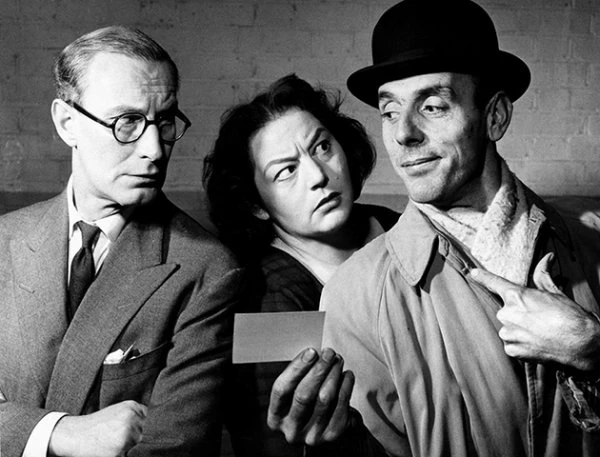
Richard Wattis
Richard Wattis was a British character actor who for over 40 years was the face of pompous officialdom whether he was portraying a civil servant, a secretary, or an administrative assistant.
He was the man who began a sentence with a rather disinterested "Can I help you?", would listen to you explain your predicament and then frustrate you with an equally dispassionate "I'm awfully sorry, there's absolutely nothing I can do to help you." He was the man who would look down his nose at you with an air of superiority and dismissive-ness in the safe knowledge that the sluggish wheels of bureaucracy would always turn in his favour. And he played that part so well that he rose to, as Bruce Eder writing for All Movie Guide observed, "something akin to star power in non-starring roles."

Richard Cameron Wattis was born on 25 February 1912 in Wednesbury, Staffordshire and was moved to Walsall at the age of four. His uncle was MP for Walsall in the mid-1920's and as a child Wattis became star-struck, idolising the screen actor Robert Donat who he frequently wrote to asking for advice on acting.
Wattis attended King Edward's School, Birmingham and Bromsgrove School, and upon finishing his education went to work for the family electrical engineering firm. It is doubtful that he ever showed any interest in the job (and during this time he became involved in amateur dramatics in Walsall at Her Majesty's Theatre) and he soon left. Having avoided one lacklustre career Wattis then managed to manoeuvre himself away from chartered accountancy and secured a position (on the advice of Donat) at Croydon Rep in 1935. Here he learned his craft with the likes of John Barron, John Le Mesurier, Jon Pertwee and Dennis Price.
By the end of the decade he was acting regularly on stage as well as producing and also appeared on the BBC's pre-World War II television broadcasts. One of the first actors to do so. He made his big-screen debut with a role in the 1939 feature A Yank at Oxford with Vivien Leigh and Robert Taylor, but like most in his profession his career was interrupted by the outbreak of hostilities and he spent the war serving in the Royal Medical Corp., as a Second Lieutenant. Upon being demobbed he returned to acting and soon found himself much in demand, first on radio and then in films, playing "pompous, dry, deadpan authority figures, snooping civil servants, and other comical pests."¹

During the 1950s Wattis starred in numerous Ealing comedies as well as the St Trinian films of Launder and Gilliat. He also appeared in Around The World in 80 Days and made his international debut in The Prince and the Showgirl. Later he appeared in ‘Carry On's,’ Norman Wisdom films, and starred in over 100 films in all.
On television he became a comic foil for Tony Hancock, Dickie Henderson and other comedians of the day. When Eric Sykes made his first television sitcom, he wrote a character called Mr Brown; a next-door neighbour who, far from being neighbourly, was snooty, pompous and fastidious. When casting the series Sykes made it quite clear that he wanted no one else but Richard Wattis. In return, Wattis was delighted to be given the part, because as he developed the role, Mr Brown became much more vulnerable and amiable than the type of character he usually played.

According to Graham McCann in his book 'Spike & Co' Wattis was far removed from his screen persona: "A cheerful, somewhat camp and relatively worldly bon vivant, he was a great thrower of parties and frequenter of high-class restaurants, a cultured quaffer of good vintage Haut-Brion and Aloxe-Corton and an avid student of history, the arts and literature. He was also quite mischievous and a good sport."
For the second series of Sykes and A... Wattis's agent asked for Richard's fee to be increased. The BBC's reaction was to ask Sykes to write Mr Brown out of the series. Sykes refused. In his autobiography, 'If I Don't Write It, Nobody Else Will' Eric Sykes wrote "...it is my firm belief that you can't buy talent on the cheap, so my cast remained unchanged, and I made sure that Richard was with us until the day he died many years later."
Richard Wattis died of a heart attack whilst dining in a Kensington restaurant on 1 February 1975, just three weeks before his 63rd birthday. His Memorial Service was held at St Pauls Church in Covent Garden (The Actor's Church), where there is a plaque in memory of him not far from his friend and colleague Hattie Jacques.
(¹)Bruce Eder
Published on January 23rd, 2020. Written by Marc Saul for Television Heaven.









